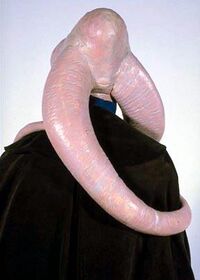Lekku/Legends

Lekku, singular lek and also known as tchun-tchin or (by other species) braintails or head-tails were the tentacles hanging from the heads of all Twi'leks.[1]
Twi'lek
The prehensile lekku protruded down the back of the skull and contained part of a Twi'lek's brain. A Twi'lek's lekku served many purposes in their daily lives and culture, storing fat and other qualities. The Twi'lek's native language of Twi'leki was spoken using a combination of words and subtle movements of the lekku.
A Twi'lek's lekku were highly sensitive, and grabbing them forcefully was so painful that it could easily incapacitate almost any Twi'lek. Despite this, some Twi'leks would cover their lekku with elaborate tattoos;[2] alternatively, they would be glitter-painted.[3] Since the top portion of the lekku near the head housed parts of a Twi'lek's brain, damage to this part of the lekku also caused lasting brain damage, since the tissue within governed basic motor functions, as well as housing repressed subconscious memories.[source?]
They could be bent around the neck or shoulders in varying combinations for aesthetic purposes, more or less compared to how Humans cultivate and arrange the shape of their hair.
Long or multiple lekku were considered great status symbols, and often went hand in hand with respect, influence and wealth. Larger lekku brought with them some indistinct positive connotations.[source?] Most male Twi'leks had longer lekku than the average females. Males also featured large bumps on their brows above each eye. The brow deposits on some truly corpulent males developed into a second set of anterior lekku. Such individuals were common in the aristocracy of Ryloth. On their homeworld, both the increased weight and the extra lekku were signs of wealth and status.
Their braintails were a source of great pride to Twi'leks, especially when confronted by other species. The name "tchun-tchin" actually referred to each lekku—tchun being left lek while tchin was the right. In casual conversation the Twi'leks would usually refer to their lekku as "tchun" or "tchin".
Appearances
Sources
|
